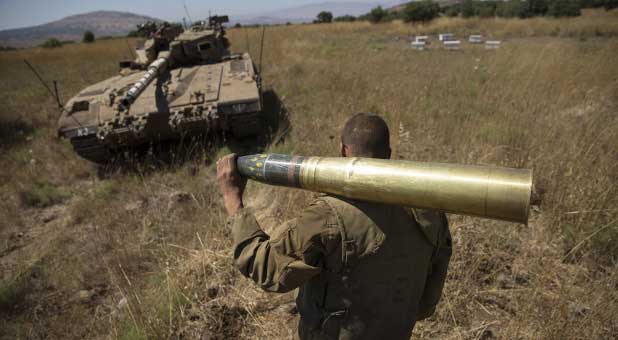Israel Faces Peril on All Fronts, Almost
At the end of a security situation assessment by the IDF General Staff on Sunday, a senior officer noted, “The only thing missing now is an incident on the Egyptian border.” This half-serious, half-sarcastic remark accurately described the defense establishment’s mood over the past week.
The precarious uncertainty that reared its head in the West Bank with the abduction of the three Israeli teens has been mirrored by the rocket fire emanating from the Gaza Strip, and now it seems it has found its way to the Syrian border, in an incident that has claimed the life of the teenage son of a Defense Ministry contractor.
The initial investigation of the incident on the northern border has found that the boy was killed by an advanced anti-tank missile, most likely a Russian-made Kornet missile.
There is little doubt that the shooters saw the Israeli vehicles traveling along the border, and that they intended to fire at them. The area adjacent to the Israel-Syria border, on the Syrian side, has already been overrun by rebels, but barring clear information about the identity of the shooters, Israel has laid blame with the area’s sovereign entity—the Syrian Army—and directed its response at its bases.
As with other, similar border incidents, defense officials have negated the possibility that Hezbollah was involved in the fire, but the fact that for the first time since Syria has plunged into civil war an Israeli was killed, is disconcerting nonetheless.
Israel has so far made sure to mount only a limited response to the events in the Gaza Strip, stemming from its desire to avoid a true security escalation. While the necessary plans have been made to counter any possible escalation, Israel’s stated intention—as relayed via Egypt to Hamas—is that Israel expects Hamas to curtail the rocket fire, and if it does, the IDF operation across Judea and Samaria will not find its way further south.
As of Sunday, Israel’s half-promise, half-threat has had only partial success: Hamas, which would prefer to avoid a security escalation, is trying to curb the rocket fire (which is mostly the work of Islamic Jihad cells and other rogue terror groups), but it has been reluctant in its efforts, and therefore in its success.
Meanwhile, Operation Brother’s Keeper in the West Bank is ongoing, and the efforts to locate Gil-ad Shaer, Eyal Yifrach and Naftali Frenkel have so far been unsuccessful.
The Israel Defense Forces has raided 1,300 locations so far, but as the target bank dwindles so will the scope of the operation. This will inevitably lead the IDF to deploy fewer troops on the ground, and from there, the operation will be based on intelligence leads and headed by special forces units.
Israel hopes that with the Ramadan holiday nearing, this will facilitate easing the pressure imposed on the population in the area, as the Palestinians have begun showing clear signs of distress and agitation, leading to clashes with security forces.
Yoav Limor is the host of the morning show on Israel’s Channel 2. A veteran military correspondent, he has been covering the Middle East conflict for the last 25 years.
For the original article, visit israelhayom.com.




























































